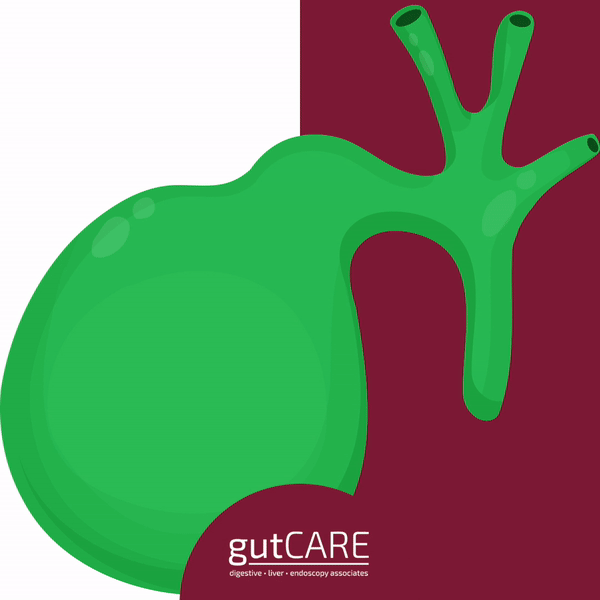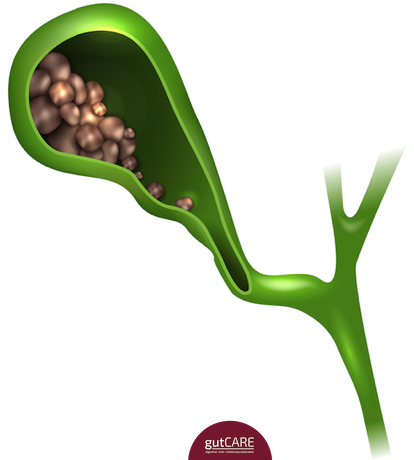Gallstone

A common health issue in Singapore, gallstones are pieces of small stones formed inside the gallbladder. Piles or haemorrhoids refer to inflamed tissues and swollen veins inside and around the anus. There are various treatments available depending on the severity, with lifestyle changes to help you improve the symptoms.
Case 1
Gallstones are very common and affect 10-15% of adults. They are solid particles formed by bile cholesterol and bilirubin in the gallbladder. They vary in sizes, from tiny grain-sized to as large as a golf ball and can form in any combination of sizes. Most people (70-85%) diagnosed with gallstones are well, and will not suffer symptoms. The gallstones are usually diagnosed incidentally during radiologic imaging for other conditions, or during health screening. Only 10-25% of asymptomatic people with gallstones will develop symptoms in their lifetime.
Gallstone symptoms occur in only a minority (15-30%) of people diagnosed with the condition. The most common symptom of gallstones is biliary pain, which is a severe pain occurring in the upper abdomen. A small number of patients may suffer from more severe complications, such as cholecystitis, jaundice, cholangitis and pancreatitis. Once symptoms occur, the risk of recurrence is high at 20-40% per year.
The definitive treatment for gallstones is surgery to remove the gallbladder. This prevents the stones from recurring. These days, the surgery is mostly done using keyhole technique, but 5-10% of patients will require open surgery. Every surgery has risks, including the risks of anaesthesia. The overall mortality risk for the surgery is about 0.5%. The most feared complication is bile duct injury. This occurs in 0.5-1%, and can cause serious problems. After surgery, 1-2% of patients may develop chronic diarrhoea, which possibly requires lifelong medication. 5-40% of patients may develop ‘post cholecystectomy syndrome’. The symptoms include: persistent pain and bloating. In most cases it is mild and short lived, but it can be persistent in a third of cases.
When considering surgery, one must balance its benefits against its risks. In asymptomatic gallstones, surgery confers no benefit, and the risks of surgery are higher than the risks of leaving the stones alone. In symptomatic gallstones, there is a high rate of recurrent symptoms and complications, justifying the risks of surgery. Certainly, there are special circumstances which warrant detailed discussion with a specialist. However, most specialists follow this general rule.
Other than surgery, another option is dissolution therapy, where medication is given to dissolve the stones. Unfortunately, this option is not ideal as the stones may take up to 2 years to dissolve, and the success rate is < 50%. Also, there is high rate of recurrence of up to 50% over 5 years. Hence, this option is only suitable for patient who is unwilling or unable to undergo surgery. The risk of gallstones may also be reduced by maintaining a healthy weight and taking regular meals. If one needs to lose weight, it is recommended to aim for a gradual weight loss of 0.5-1.0 kg per week. Skipping meals, rapid weight loss or being overweight increase the risk of gallstones.
In your case, I would suggest that you hold off surgery until you develop symptoms. Statistically, you have a 75-90% of not developing problems from the gallstones in your lifetime. Hence, the risks of surgery are not warranted at this time.

Case 2
Piles is a very common condition and the treatment depends on its severity. In most cases, the symptoms are mild and may improve dramatically with simple measures. These include:
- Add more fibre to your diet. Fibre helps to soften stool and makes them easier to pass, relieving pressure on the hemorrhoids. Start slowly and gradually increase to 25-30g of fibre intake daily. A fibre supplement may help if diet sources are inadequate.
- Drink plenty of fluids. Aim for 6-8 glasses of water or fluid (not alcohol) daily. Drink more if you are exercising or sweating a lot.
- Exercise. Moderate aerobic exercise of 20-30min daily can help to stimulate bowel movement.
- Establish healthy bowel habits. Schedule a set time each day to pass motion. Avoid straining or prolonged periods in the toilet. Go as soon as there is an urge rather than wait.
If the piles are larger and symptoms are frequent, a simple outpatient based procedure may be performed. Rubber band ligation is the most commonly used, where one or two tiny rubber bands are applied to the base of the internal pile to cut off its circulation. The pile then withers and falls off within a week, and recovery time is fast. It has a success rate of 60-80%, but more than 1 session may be required.
Surgery is required for larger piles. The overall risk of recurrence after surgery is about 5%. Recurrence can be minimized by taking the lifestyle measures mentioned above. The surgeon will either remove the piles completely, or staple the piles back to their normal position and block their blood flow. The stapled technique offers less pain and faster recovery, but is associated with a higher rate of recurrence. The surgeon will discuss the various options with the patient.
In your case, yes, it is unusual to bleed for so long. I would be careful to evaluate for other colon disorders that can cause bleeding rather than simply attribute the bleeding to piles. Important conditions to consider include cancers and growths, as well as inflammatory bowel disease. These can all present with bleeding similar to piles. Another possibility is a bleeding disorder, where bleeding occurs for a longer time than it normally should. I would recommend consulting a specialist for a proper evaluation and testing to determine the appropriate treatment. This is especially since you are already 46 years old, and hence, are at risk of more serious conditions that are associated with age.
Hemorrhoid cancer is a misnomer. There is no link between hemorrhoids and cancer. However, the symptoms of hemorrhoids, especially bleeding, are similar to colorectal and anal cancers. Located in Singapore, GUTCARE is a gastroenterology clinic that provides a range of sub-specialized care and clinical services for liver and digestive disorders. Consult with our team of specialists today so your symptoms can be properly assessed, and cancer is not missed. This is especially pertinent if the symptoms are recurrent or persistent.




